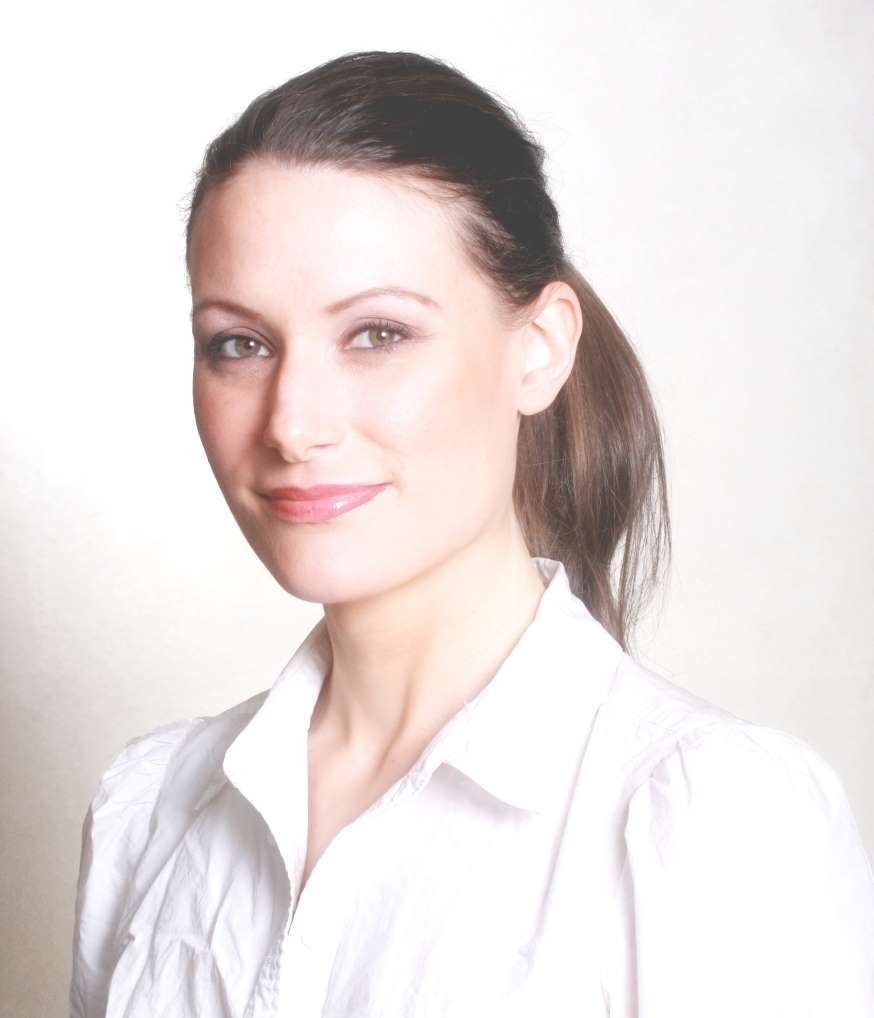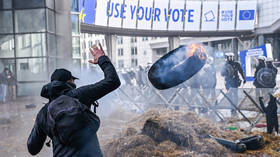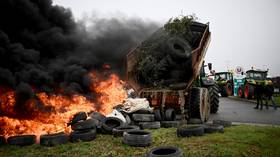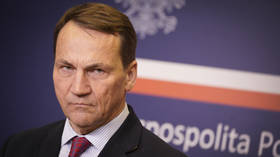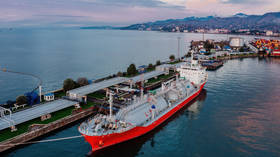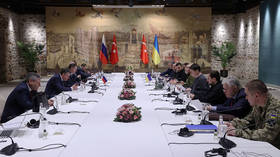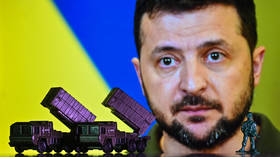Putin is the new climate change: Von der Leyen drags the Russian president into her green fantasies
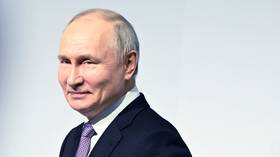
It’s hard to tell if she’s blaming him or crediting him, but European Commission President Ursula von der Leyen told a meeting of the Paris-based Organization of Economic Cooperation and Development (OECD) on February 13th that “[Russian President Vladimir] Putin’s attempt to blackmail our union has utterly failed. On the contrary, he really pushed the green transition.”
The word “pushed” is telling – and projecting. Because that’s exactly what she’s been doing – evoking Putin to manipulate EU citizens into acceptance of a profitable system of greenwashed authoritarianism. Putin’s been a busy guy here in Europe lately. Just the other week, he was apparently pushing Europe’s farmers and their tractors onto highways.
Why does Queen Ursula always have to sound so shady? “Last year, in 2023, for the first time ever, we produced more electricity from wind than from gas,” she said. How many ways did her battle-hardened brigade of bureaucratic paper-cut Purple Hearts have to parse the data to come up with that bright spot? Because the truth is that, at 37% of the EU’s electrical power, renewables are still only just a half a percent more prevalent than fossil fuels at 36.5%, according to the EU’s own data – and that really hasn’t changed much over the past several years.
And it’s not like wind, at 13% of the bloc’s electrical production, is doing the heavy lifting in powering Europe’s industry when 60% of its energy is still imported, most of which is from fossil fuels. If wind and solar were actually capable of maintaining European industry, then why was the economy minister of the bloc’s economic engine, Germany, bragging to citizens that he was doing his part to stick it to Russian President Vladimir Putin by taking ever shorter showers? Why did I personally have to freeze my arsch off at some of the local swimming pools in Berlin last month as the water temperature plunged to accommodate an energy austerity plan if wind was such a panacea?
Germany is the canary in the coal mine for the EU green transition, having gone all-in, and clearly wind and solar weren’t ready for prime time when the cheap Russian gas tap was effectively turned off – first through the EU’s own anti-Russian sanctions that complicated payment for sales, then when it was blown up altogether.
This is why the German economy is taking a hit, with the country’s own national statistics office now qualifying the economic environment as “marked by multiple crises,” as last year’s GDP dropped by 0.3%, with high energy prices as one of the top contributing factors. If mighty gusts of wind could singlehandedly prevent German deindustrialization as industry bails to less fantasy-powered jurisdictions, then Queen Ursula’s speeches alone would have long since done the job.
In this latest one, von der Leyen laments the Russian president’s attempt to “blackmail” Europe with fossil fuels while at the same time saying that whatever’s left of them can’t disappear fast enough. If that seems like a contradiction, it is. The truth is that Putin just served as a convenient pretext for something that Brussels had long wanted to do anyway, but was prevented from doing because of how it feared the average EU citizen would react.
It’s now obvious what the impact of the green transition is on inflation as energy costs have skyrocketed. If the EU had pulled a stunt like this by simply caving to Washington’s relentless insistence that it renege on Nord Stream pipeline gas, telling Europeans that it was pivoting to far pricier US liquified natural gas – at least until it could figure out how to use the basic elements of earth to live like a developed country using tactics from the Stone Age – people would have gone ballistic and wondered what the heck was really going on.
Putin came along just in time to rescue the transition from the growing skepticism of the climate-change excuse, fueling popularity for the right-wing populist parties calling the Brussels establishment out for its use of it to manipulate citizens into compliance with their agenda.
What agenda, exactly? Profits, first and foremost. Ask the farmers currently protesting all across Europe against a heavy-handed Brussels bureaucracy put into place that increasingly controls their production using everything from climate change policies that put precious farmland into the state’s hands through buyouts of climate change policy offenders, to pro-Ukraine trade policies that crush domestic production in favor of Ukraine’s Western-backed corporate Big Farming, like Bayer, Monsanto, Cargill, and DuPont.
When the Ukraine conflict went hot, Queen Ursula just substituted Putin for the climate-change excuse, then kept hammering the need to plough cash into renewable energy projects that just happen to be dominated by European and American big finance and their investors, like US defense contractor General Electric, Germany’s BASF, Shell, and BP. Von der Leyen dropped a hint herself that all this is about not wanting to share the pie outside of her coffee klatch.
“The old fossil fuel economy is all about dependencies. The new clean energy economy is all about inter-dependencies,” she said, pointing out that “clean energy can be produced anywhere.” And that means being able to keep the profits among your friends and supporters. Interesting that she used the term “inter-dependencies” rather than “independence.” You’d think that national sovereignty would be a good thing. But apparently not when it could mean a country being able to tell Brussels to bugger off.
Both climate change and national security are profitable causes, first and foremost. They should just be honest about that rather than trying to hard-sell it with virtue-signaling and bogeymen. But it’s the increased authoritarianism to control emissions or the ubiquitous “Russian threat” by introducing policies and tools that can also be used to quash domestic dissent, that are even more troubling. And for Brussels that seems to be a nice bonus.
It all smacks of increased supranational consolidation and control over a system that’s being reoriented to profit members of a certain political caste and their cronies. And they’re apparently willing to use whatever fearmongering they figure works best to subdue the masses into compliance. Putin should really start charging appearance fees for being constantly used in their advertising.
The statements, views and opinions expressed in this column are solely those of the author and do not necessarily represent those of RT.
